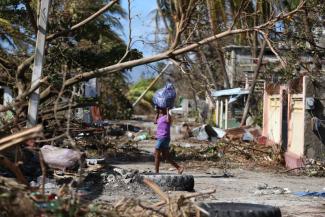Insurance
Beyond the begging bowl

Malawi has its share of the climate-change impacts, says Ronald Mangani, secretary to the country’s treasury. According to the top bureaucrat, his government is aware of the challenges and wants to prepare for disasters. One way of doing so was to become a member of the African Risk Capacity (ARC), a specialised AU agency that serves to pool and transfer risks in a continent-spanning climate response system.
The ARC is basically an insurance system. It is supported by Germany and Britain, and a part of the risk is covered by private-sector reinsurance companies. On behalf of Germany’s Federal Government, KfW Development Bank has contributed $ 50 million.
So far, the ARC sells African government insurances to protect their people from the impacts of drought. Other insurance schemes will follow – against the impact of storms, for example.
The ARC is meant to pay out money when rains fail. However, when 8.5 million Malawian farmers were hit by draught this year, the ARC initially refused to pay. Secretary Mangani knows the reasons. The ARC assumed that the farmers were cultivating a different kind of maize than they actually were. If they had grown maize of 120 day maturity, as the ARC believed, the crop would have been saved by late rains. But in actual fact, the harvest failed because the shorter-maturity plants had already dried up. After having understood the situation better, the ARC management recently decided to pay out $ 8.1 million in disaster relief, Mangani reports. He appreciates the ARC’s willingness to learn.
Last year, three other countries benefited from ARC membership. Together, Senegal, Mauretania and Niger got $ 26 million because of draught. Between them, they had paid $ 8 million for insurance policies.
In 2016, moreover, the government of Haiti received almost $ 20 million from a similar scheme, which is called the Caribbean Catastrophe Risk Insurance Facility (CCRIF), after the island nation was hit by Hurricane Matthew. CCRIF paid another $ 9 million to other governments in the affected region.
The insurance approach makes sense, says Stefan Dercon, the chief economist of Britain’s Department for International Development (DfID), because it “creates certainty in an uncertain world”. In his eyes, it is remarkable that, thanks to CCRIF, Haiti received money two weeks after the hurricane struck. In the past, disaster relief was typically the result of extended negotiations, involving charitable organisations and donor governments. The “begging bowl” was the basic approach, according to Dercon, with “12th century finance” being used to deal with “21st century problems”.
Dercon points out that having to beg for humanitarian support is not only deeply embarrassing for the governments concerned. It is also time consuming and leads to sub-optimal results. Governments are tempted to cry wolf and to free ride, he says. Moreover, information is scant and coordination inadequate. The economist says it is much better to conclude contracts that spell out precisely what amounts of money will flow in what kind of disaster circumstances. In Dercon’s words, this kind of disaster relief can be “fast and rules-based”.
There are serious challenges, of course. As the example of Malawi shows, scenarios are not always understood well beforehand. Solid data matter, but are not available everywhere. Providing money to governments, moreover, is insufficient for solving the problems of people hit by disaster. Dercon worries that Haiti may not use its money well. Its government, after all, is “one of the weakest on Earth”.
Germany’s Federal Ministry for Economic Cooperation and Development (BMZ) appreciates the developmental potential of insurance schemes. As Ingrid-Gabriela Hoven, a director-general at the BMZ, told a conference hosted by KfW in Frankfurt in November, now is “the perfect time to focus on insurance”. One reason is that insurance schemes can contribute to managing climate risks, which are expected to increase. In a more general sense, Hoven wants insurance to become “embedded in the development-policy agenda”. She says, for example, that “smart subsidies” for insurance coverage can contribute to providing social protection to poor people, without endangering financial sustainability or creating moral hazard.
.
Hans Dembowski








